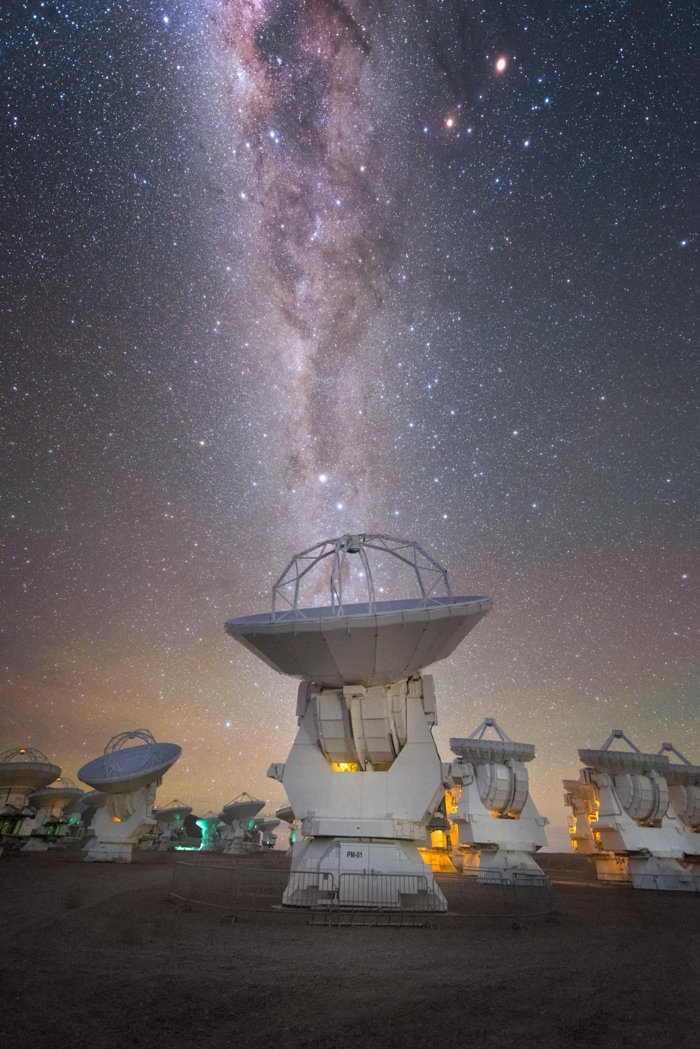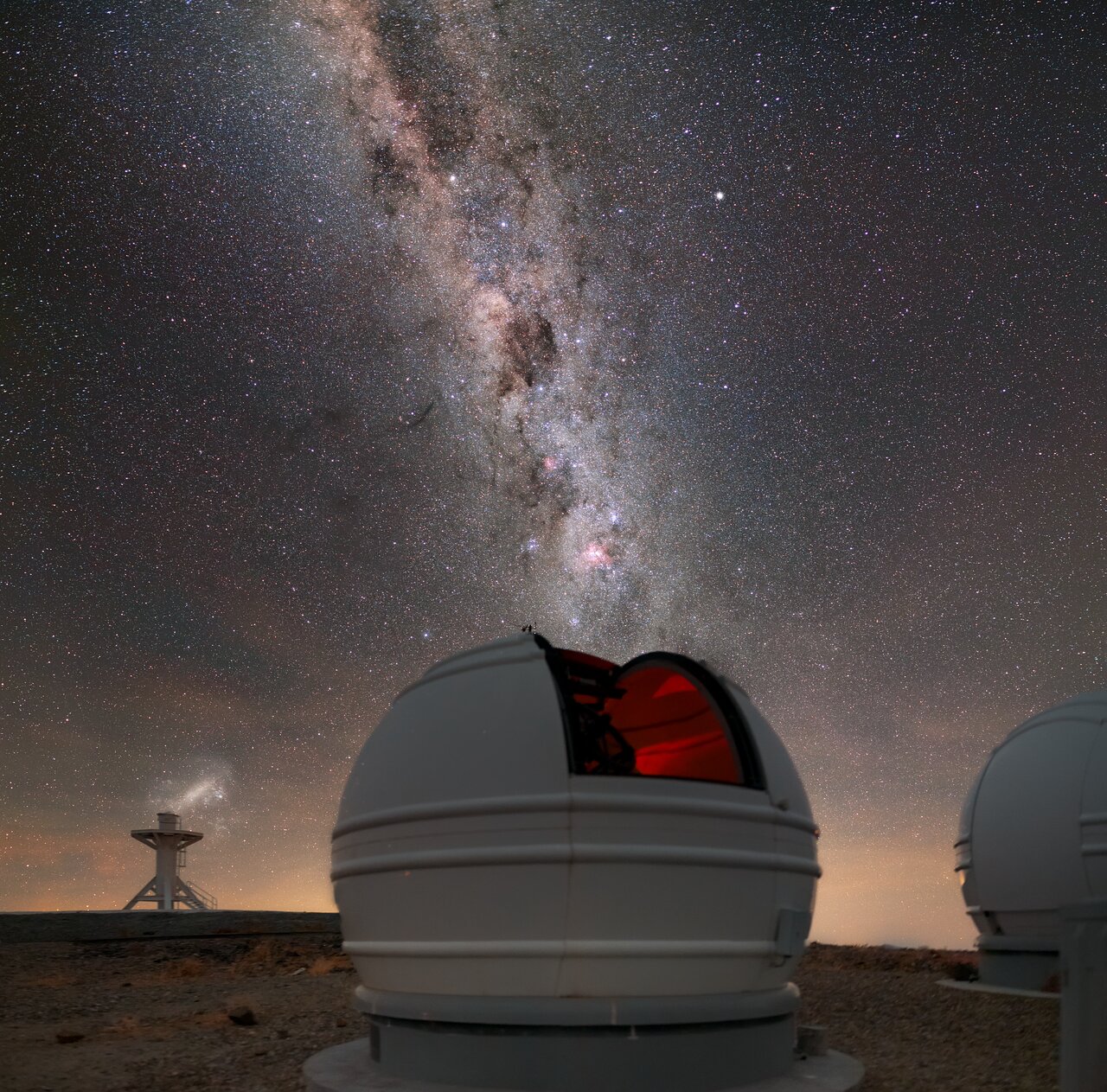Page 1 of 3
Found Images: 2020 June
Posted: Mon Jun 01, 2020 2:13 pm
by bystander
Have you seen a great image or video somewhere that you think would make a great APOD? Nominate it for APOD! Please post as much information here as you have about the image/video with a link to any source(s) for it you know of here, and the editors will take a look.
When posting the image itself, please do not post anything larger than a thumbnail here; please honor the copyright holder's copyright.
Please keep hotlinked images under 500K.
Thank you!
<< Previously
ESO: Other Worlds (ALMA)
Posted: Mon Jun 01, 2020 2:24 pm
by bystander
Other Worlds
ESO Picture of the Week | 2020 Jun 01
One of the most exhilarating results in modern astronomy is the knowledge that the Universe is full of worlds beyond our Solar System, known as
exoplanets. Increasing evidence suggests that the majority of stars in the Universe have planets whizzing around them; one such system can be seen in this majestic
Picture of the Week.
The antennas here are among the 66 that make up the Atacama Large Millimeter/submillimeter Array (
ALMA), located on the Chajnantor plateau in Chile. Two bright stars sit directly above the centre antenna; the brightest of these two stars is a triple star system known as
Alpha Centauri. An
exoplanet named Proxima b was recently discovered orbiting within the
habitable zone of one these three stars (
Proxima Centauri) by ESO telescopes and other facilities. As Alpha Centauri is the closest star system to Earth, Proxima b is the closest exoplanet to Earth ever discovered.
Another world can be seen in this stunning sky — this time, one a little closer to home. At the top of the image, two bright, reddish objects sit just outside the main river of the Milky Way. The one on the left is
Antares — a red giant star in
Scorpius — and the one on the right is
Saturn, the spectacular ringed gas giant planet.
HEIC: Stellar Snowflakes (NGC 6441)
Posted: Mon Jun 01, 2020 2:32 pm
by bystander
Stellar Snowflakes
ESA Hubble Picture of the Week | 2020 Jun 01
Almost like snowflakes, the stars of the
globular cluster NGC 6441 sparkle peacefully in the night sky, about 13 000 light-years from the Milky Way’s
galactic centre. Like snowflakes, the exact number of stars in such a cluster is difficult to discern. It is estimated that together the stars weigh 1.6 million times the mass of the Sun, making
NGC 6441 one of the most massive and luminous globular clusters in the Milky Way.
NGC 6441 is host to four
pulsars that each complete a single rotation in a few milliseconds. Also hidden within this cluster is
JaFu 2, a
planetary nebula. Despite its name, this has little to do with planets. A phase in the evolution of intermediate-mass stars, planetary nebulae last for only a few tens of thousands of years, the blink of an eye on astronomical timescales.
There are about 150 known globular clusters in the Milky Way. Globular clusters contain some of the first stars to be produced in a galaxy, but the details of their origins and evolution still elude astronomers.
Re: Found Images: 2020 June
Posted: Mon Jun 01, 2020 10:34 pm
by starsurfer
Re: Found Images: 2020 June
Posted: Mon Jun 01, 2020 10:37 pm
by starsurfer
Re: Found Images: 2020 June
Posted: Mon Jun 01, 2020 10:39 pm
by starsurfer
Re: Found Images: 2020 June
Posted: Mon Jun 01, 2020 10:41 pm
by starsurfer
Kronberger 63
https://www.britastro.org/node/20295
Copyright: Peter Goodhew
Re: Found Images: 2020 June
Posted: Mon Jun 01, 2020 10:44 pm
by starsurfer
DrZi 1
https://www.astrobin.com/f8o5xg/
Copyright: Andreas Zirke and Marcel Drechsler
Re: Found Images: 2020 June
Posted: Mon Jun 01, 2020 10:46 pm
by starsurfer
M79
http://www.chart32.de/index.php/component/k2/item/259
Copyright: CHART32
Processing: Bernd Flach-Wilken
Re: Found Images: 2020 June
Posted: Mon Jun 01, 2020 10:48 pm
by starsurfer
Tarantula Nebula (NGC 2070)
http://www.starpointing.com/ccd/ngc2070.html
Copyright: Fabian Neyer
Re: Found Images: 2020 June
Posted: Sat Jun 06, 2020 3:18 pm
by Ann
M88
http://www.caelumobservatory.com/gallery/m88_32in.shtml
Credit and copyright: Adam Block
M88 is a very interesting galaxy.
Wikipedia wrote:
M88 is one of the fifteen Messier objects that belong to the nearby Virgo Cluster of galaxies. It is galaxy number 1401 in the Virgo Cluster Catalogue (VCC) of 2096 galaxies that are candidate members of the cluster.[5] M88 may be on a highly elliptical orbit that is carrying it toward the cluster center, which is occupied by the giant elliptical galaxy M87. It is currently 0.3–0.48 million parsecs from the center and will come closest to the core in about 200–300 million years. The motion of M88 through the intergalactic medium of the Virgo cluster is creating ram pressure that is stripping away the outer region of neutral hydrogen. This stripping has already been detected along the western, leading edge of the galaxy.
So although M88 has a rather small yellow center and an intricate set of dusty spiral arms, it is losing its gas and its ability to form new stars due to its motion through the intergalactic medium of the Virgo Cluster.
Ann
ESO: The UHD Universe (VLT)
Posted: Mon Jun 08, 2020 4:08 pm
by bystander
The UHD Universe
ESO Picture of the Week | 2020 Jun 08
n 2016, a team of four world-class astrophotographers and videographers journeyed to ESO’s
Paranal Observatory in Chile.
Their goal? To capture striking views of the Universe in ultra high definition (UHD) and fulldome formats — perfect for use in planetarium shows! Over the course of a few weeks, the photographers gathered
UHD stills,
fulldome timelapses,
360-degree panoramas, and more, including a whole host of breathtaking shots of their surroundings.
One such shot is this ESO Picture of the Week, which shows Paranal — home to ESO’s Very Large Telescope (
VLT) — at night. The stargazer visible to the right of the frame, pointing to the beautiful arc of the Milky Way curving overhead, is
ESO Photo Ambassador Babak Tafreshi, one of the aforementioned
expedition members. The constituent telescopes of the VLT can be seen scattered across the left of the frame (the four boxy
Unit Telescopes, and three of the four rounder
Auxiliary Telescopes).
The products returned by ESO’s 2016 UHD Expedition are being used by the
ESO Supernova Planetarium & Visitor Centre, which opened in May 2018. The ESO Supernova is a collaboration between ESO and the
Heidelberg Institute for Theoretical Studies, and the building was
donated by German foundation the
Klaus Tschira Stiftung.
HEIC: One Amongst Millions (NGC 2608)
Posted: Mon Jun 08, 2020 4:14 pm
by bystander
One Amongst Millions
ESA Hubble Picture of the Week | 2020 Jun 08
Looking deep into the Universe, the NASA/ESA Hubble Space Telescope catches a passing glimpse of the numerous arm-like structures that sweep around this
barred spiral galaxy, known as
NGC 2608. Appearing as a slightly stretched, smaller version of our Milky Way, the peppered blue and red spiral arms are anchored together by the prominent horizontal central bar of the galaxy.
In Hubble photos, bright
Milky Way stars will sometimes appear as pinpoints of light with prominent
lens flares. A star with these features is seen in the lower right corner of the image, and another can be spotted just above the pale centre of the galaxy. The majority of the fainter points around
NGC 2608, however, lack these features, and upon closer inspection they are revealed to be thousands of distant galaxies. NGC 2608 is just one among an uncountable number of kindred structures.
Similar expanses of galaxies can be observed in other Hubble images such as the
Hubble Deep Field which recorded over 3000 galaxies in one
field of view.
Re: Found Images: 2020 June
Posted: Mon Jun 08, 2020 8:01 pm
by barretosmed
JUPITER
BEST DETAILS
https://www.astrobin.com/oh33qp/C/?nc=user
Equipment
MEADE LX200 10 "UHTC
ZWO Optical ASI 290 MC
Filter: Baader Planetarium L 1.25 "
Accessory: TeleVue Powermate 2.5x
Mount: Ioptron Cem60
Polar alignment: Sharcap
Capture: SharpCap V3.0
Processing: Photoshop CS6, , AutoStakkert AutoStackert !, Registax 6, Winjoups
May 28, 2020
Sao Paulo-SP-BRAZIL
Copyright: Fernando Oliveira de Menezes
Re: Found Images: 2020 June
Posted: Tue Jun 09, 2020 1:57 pm
by starsurfer
Re: Found Images: 2020 June
Posted: Tue Jun 09, 2020 2:01 pm
by starsurfer
Re: Found Images: 2020 June
Posted: Tue Jun 09, 2020 2:04 pm
by starsurfer
Abell 2197
http://outters.fr/wp/?p=8631
Copyright: Nicolas Outters
AAS: Fractals in Cosmic Gas
Posted: Wed Jun 10, 2020 10:44 pm
by bystander
Fractals in Cosmic Gas
AAS Featured Image | 2020 Jun 08
What happens in galactic and intergalactic settings when cold, dense gas moves through hot, diffuse gas? You can see the result in the complex simulations shown above (click for a closer look), as reported in a recent publication led by scientist Drummond Fielding (Center for Computational Astrophysics, Flatiron Institute). Turbulent mixing layers like those simulated by Fielding and collaborators form in a vast variety of cosmic environments: the interstellar medium, the circumgalactic medium, expanding supernova remnants, cosmic filaments, galactic winds, protoplanetary disks, the solar corona, and many more. The authors’ new models show the fractal nature of the cooling surface that arises within these layers as the gases mix.
You can watch the animated version of the simulation
here, which shows how eight different fluid properties evolve over time in a turbulent layer containing mixing cold and hot gas. For more information, check out the original article, linked below.
Multiphase Gas and the Fractal Nature of Radiative Turbulent Mixing Layers ~ Drummond B. Fielding
et al
Re: Found Images: 2020 June
Posted: Thu Jun 11, 2020 1:51 pm
by starsurfer
Re: Found Images: 2020 June
Posted: Thu Jun 11, 2020 1:53 pm
by starsurfer
Crescent Nebula (NGC 6888) and Soap Bubble Nebula (Ju 1)
https://www.astrobin.com/421263/B/
Copyright: Hunter Harling
Re: Found Images: 2020 June
Posted: Thu Jun 11, 2020 7:54 pm
by Ann
The Cone Nebula and the Christmas Tree Cluster
https://astronomy.com/-/media/Images/Ph ... 000&mh=800
Photo: Miguel Claro from Corroios, Portugal
Re: Found Images: 2020 June
Posted: Sat Jun 13, 2020 10:25 pm
by starsurfer
CTB 1
http://www.capella-observatory.com/Imag ... s/CTB1.htm
Copyright: Josef Pöpsel, Frank Sackenheim and Stefan Binnewies
Re: Found Images: 2020 June
Posted: Sun Jun 14, 2020 3:54 pm
by starsurfer
Re: Found Images: 2020 June
Posted: Mon Jun 15, 2020 2:21 pm
by starsurfer
ESO: Looking into Crystal-Clear Skies (La Silla)
Posted: Mon Jun 15, 2020 4:20 pm
by bystander
Looking into Crystal-Clear Skies
ESO Picture of the Week | 2020 Jun 15
ESO’s
La Silla Observatory boasts a remarkably high number of cloud-free nights a year. The billions of stars that make up the Milky Way is a very common sight indeed. The dome shown in this image houses one of three 60-centimetre telescopes that make up the
ExTrA project, which had its first light in late 2017.
This small group of telescopes is primarily designed to detect distant
exoplanets transiting in front of bright and nearby
red dwarf stars. The project aims to discover as many transiting planets as possible — including Earth-size planets in the habitable-zone — and to determine their structure and composition. These planets will then be observed by the world’s
largest telescopes, in order to characterise their atmospheres.







